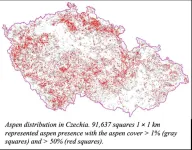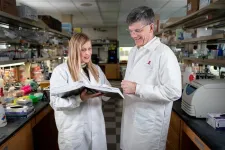(Press-News.org) Emotional reactions to climate change may lead to specific policy preferences, according to a study published March 27, 2024 in the open-access journal PLOS Climate by Teresa A. Myers of George Mason University and colleagues.
A politician, public speaker, or journalist may opt for an emotional appeal when communicating about climate change. Indeed, research shows that emotional investment can raise awareness of important issues and galvanize an otherwise apathetic public. However, existing research has not explored the unique links between specific emotions and support for types of climate policies.
Myers et al. explored whether five common emotional reactions to climate change (guilt, anger, hope, sadness, and fear) lead to distinct climate policy preferences using survey questions drawn from the ongoing Climate Change in the American Mind survey project. Survey questions clarified respondents' emotional responses to climate change (e.g., “How strongly do you feel each of the following emotions when you think about … global warming?”) and support for specific policies (e.g., “Increase federal funding to low-income communities and communities of color who are disproportionately harmed by air and water pollution”).
Surveys were distributed via Ipsos every six months from 2010 to 2022. Of the 16,605 total participants, 51% reported their gender as female and 73% reported their race as “White, Non-Hispanic.” On average, participants were ages 45-54 and received “Some college” education. Survey questions did account for political ideology as well.
Results indicated that the five emotions are uniquely associated with support for specific categories of climate policy preferences:
● Guilt and anger are most strongly associated with support for personally costly policies (e.g., paying a gasoline tax).
● Hope and sadness are most strongly associated with support for proactive policies (e.g., investing in infrastructure).
● Fear, while most strongly associated with support for regulatory policies (e.g., regulating emissions) in comparison to other types of policies, was most strongly associated with all types of policy support in comparison to other emotions.
The researchers state that these results underscore the importance of emotion for understanding and encouraging climate policy support. For example, individuals and organizations advocating for proactive climate solutions might appeal to feelings of hope.
The authors add: "We find that in comparison to other policy options: those who are more fearful of climate change are more likely to support regulatory-first approaches to policy; those who feel more guilty support personally costly climate policies; and those who are more hopeful support more proactive climate policies like generating renewable energy on public land."
#####
In your coverage please use this URL to provide access to the freely available article in PLOS Climate: https://journals.plos.org/climate/article?id=10.1371/journal.pclm.0000381
Citation: Myers TA, Roser-Renouf C, Leiserowitz A, Maibach E (2024) Emotional signatures of climate policy support. PLOS Clim 3(3): e0000381. https://doi.org/10.1371/journal.pclm.0000381
Author Countries: United States
Funding: Funding sources are: The 11th Hour Project (AL), the Energy Foundation (AL, TM, & EM), the Grantham Foundation for Protection of the Environment (AL), and the MacArthur Foundation (AL). The funders had no role in study design, data collection and analysis, decision to publish, or preparation of the manuscript.
END
Your emotional reaction to climate change may impact the policies you support
Hopeful people put faith in proactive policies; guilty people atone with personally costly options.
2024-03-27
ELSE PRESS RELEASES FROM THIS DATE:
Persistent hiccups in a far-off galaxy draw astronomers to new black hole behavior
2024-03-27
At the heart of a far-off galaxy, a supermassive black hole appears to have had a case of the hiccups.
Astronomers from MIT, Italy, the Czech Republic, and elsewhere have found that a previously quiet black hole, which sits at the center of a galaxy about 800 million light years away, has suddenly erupted, giving off plumes of gas every 8.5 days before settling back to its normal, quiet state.
The periodic hiccups are a new behavior that has not been observed in black ...
Europe’s forgotten forests could be 21st century ‘biodiversity hot spots’
2024-03-27
An overlooked and long-neglected type of forest has vast capacity to rebound, enhancing species diversity and resilience to climate change, according to an international team of forest scientists.
According to new research, published today in the peer-reviewed science journal PLOS ONE, there is ample habitat for the Eurasian aspen, and these environments will continue to be suitable for this “keystone species” as the global climate warms.
“The Eurasian aspen, and aspen species globally, are home to vast populations of other dependent plants and animals,” said the study’s lead author, Antonin Kusbach, an applied ecologist at Mendel University in ...
Combining epigenetic cancer medications may have benefit for colorectal cancers and other tumor types
2024-03-27
GRAND RAPIDS, Mich. (March 27, 2024) — A pair of medications that make malignant cells act as if they have a virus could hold new promise for treating colorectal cancers and other solid tumors, reports a study published today in Science Advances.
The preclinical research, led by Van Andel Institute scientists, determined how low doses of a DNMT inhibitor sensitize cancer cells to an EZH2 inhibitor, resulting in a one-two punch that combats cancer cells better than either drug alone.
The findings are the foundation for an upcoming Phase I clinical trial to evaluate this combination ...
Reevaluating an approach to functional brain imaging
2024-03-27
A new way of imaging the brain with magnetic resonance imaging (MRI) does not directly detect neural activity as originally reported, according to scientists at MIT’s McGovern Institute. The method, first described in 2022, generated excitement within the neuroscience community as a potentially transformative approach. But a study from the lab of McGovern associate investigator Alan Jasanoff, reported March 27, 2024, in the journal Science Advances, demonstrates that MRI signals produced by the new method are generated in large part by the imaging process itself, ...
Food matters: Healthy diets increase the economic and physical feasibility of 1.5°C
2024-03-27
“We find that a more sustainable, flexitarian diet increases the feasibility of the Paris Agreement climate goals in different ways,” says Florian Humpenöder, PIK scientist and co-lead author of the study to be published in Science Advances. “The reduction of greenhouse gas emissions related to dietary shifts, especially methane from ruminant animals raised for their meat and milk, would allow us to extend our current global CO2 budget of 500 gigatons by 125 gigatons and still stay within the limits of 1.5°C with a 50 percent chance,” he adds.
Putting a price on greenhouse gas (GHG) emissions ...
Land under water – what causes extreme flooding
2024-03-27
There are several factors that play an important role in the development of floods: air temperature, soil moisture, snow depth, and the daily precipitation in the days before a flood. In order to better understand how individual factors contribute to flooding, UFZ researchers examined more than 3,500 river basins worldwide and analysed flood events between 1981 and 2020 for each of them. The result: precipitation was the sole determining factor in only around 25% of the almost 125,000 flood events. Soil moisture was the decisive factor in just over 10% of cases, and ...
Understanding why people sell their kidneys
2024-03-27
A systematic review of 35 years of global medical literature finds a spectrum of reasons why people sell kidneys. The study, by Bijaya Shrestha of the Center for Research on Education, Health and Social Science, Kathmandu, Nepal, finds limited efforts toward mitigating the problem as well as a lack of evidence around the impact of policy and biotechnology. It is published in the open access journal PLOS Global Public Health.
Demand for kidney donation is higher than supply, and it has become one of the most saleable human ...
Researchers turn back the clock on cancer cells to offer new treatment paradigm
2024-03-27
St. Jude Children’s Research Hospital scientists reversed an aggressive cancer, reverting malignant cells towards a more normal state. Rhabdoid tumors are an aggressive cancer which is missing a key tumor suppressor protein. Findings showed that with the missing tumor suppressor, deleting or degrading the quality control protein DCAF5 reversed the cancer cell state. These results suggest a new approach to curing cancer — returning cancerous cells to an earlier, more normal state rather than killing cancer cells with toxic therapies — may be possible. The results were published today in Nature.
“Rather than making a toxic event that kills rhabdoid ...
SwRI leads airborne, ground-based 2024 eclipse observation projects
2024-03-27
SAN ANTONIO — March 27, 2024 —Southwest Research Institute is leading two groundbreaking experiments — on the ground and in the air — to collect astronomical data from the total solar eclipse that will shadow a large swath of the United States on April 8, 2024. SwRI’s Dr. Amir Caspi leads the Citizen Continental-America Telescopic Eclipse (CATE) 2024 experiment, a broad scientific outreach initiative funded by the National Science Foundation (NSF) and NASA, that will ...
Lighting up the future
2024-03-27
New multidisciplinary research from the University of St Andrews could lead to more efficient televisions, computer screens and lighting.
Researchers at the Organic Semiconductor Centre in the School of Physics and Astronomy, and the School of Chemistry have proposed a new approach to designing efficient light-emitting materials in a paper published this week in Nature (27 March).
Light-emitting materials are used in organic light-emitting diodes (OLEDs) that are now found in the majority of mobile ...
LAST 30 PRESS RELEASES:
A shift from the sandlot to the travel team for youth sports
Hair-width LEDs could replace lasers
The hidden infections that refuse to go away: how household practices can stop deadly diseases
Ochsner MD Anderson uses groundbreaking TIL therapy to treat advanced melanoma in adults
A heatshield for ‘never-wet’ surfaces: Rice engineering team repels even near-boiling water with low-cost, scalable coating
Skills from being a birder may change—and benefit—your brain
Waterloo researchers turning plastic waste into vinegar
Measuring the expansion of the universe with cosmic fireworks
How horses whinny: Whistling while singing
US newborn hepatitis B virus vaccination rates
When influencers raise a glass, young viewers want to join them
Exposure to alcohol-related social media content and desire to drink among young adults
Access to dialysis facilities in socioeconomically advantaged and disadvantaged communities
Dietary patterns and indicators of cognitive function
New study shows dry powder inhalers can improve patient outcomes and lower environmental impact
Plant hormone therapy could improve global food security
A new Johns Hopkins Medicine study finds sex and menopause-based differences in presentation of early Lyme disease
Students run ‘bee hotels’ across Canada - DNA reveals who’s checking in
SwRI grows capacity to support manufacture of antidotes to combat nerve agent, pesticide exposure in the U.S.
University of Miami business technology department ranked No. 1 in the nation for research productivity
Researchers build ultra-efficient optical sensors shrinking light to a chip
Why laws named after tragedies win public support
Missing geomagnetic reversals in the geomagnetic reversal history
EPA criminal sanctions align with a county’s wealth, not pollution
“Instead of humans, robots”: fully automated catalyst testing technology developed
Lehigh and Rice universities partner with global industry leaders to revolutionize catastrophe modeling
Engineers sharpen gene-editing tools to target cystic fibrosis
Pets can help older adults’ health & well-being, but may strain budgets too
First evidence of WHO ‘critical priority’ fungal pathogen becoming more deadly when co-infected with tuberculosis
World-first safety guide for public use of AI health chatbots
[Press-News.org] Your emotional reaction to climate change may impact the policies you supportHopeful people put faith in proactive policies; guilty people atone with personally costly options.






